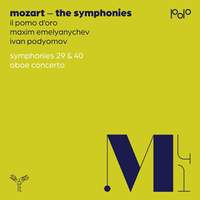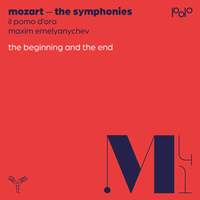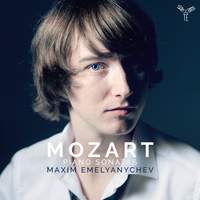Interview,
Maxim Emelyanychev on Mozart
Around the time that the first volume was released, I had the pleasure of eavesdropping on the recording-sessions for the second instalment in Padua's beautiful Scuola della Carità - and sitting down with Maxim during one of the breaks to discuss his first (very early!) experience of Mozart as little more than a toddler, the intriguing thematic connections between the composer's first and final symphonies, and being told that he'd 'left it a little too late' to pursue conducting at the grand old age of twelve...
Do you have a clear memory of the first time you heard any of Mozart’s music?
A recording of the Mozart Requiem which my parents had at home was the first CD I ever heard: I was three or four years old at the time, so this was back in the era of tapes when CDs were cutting-edge technology! Even as many people are moving over to streaming, I still think the CD is such a natural fit for classical music, because it lends itself so well to the classic ‘Overture - Concerto - Symphony’ format. Of course people experiment with all sorts of different lengths and shapes for concerts these days, but it’s a bit like tailoring in a way: you can dress a classic jacket up or down, but because the proportions just work it’s always going to look good!
And when did you start studying and performing Mozart yourself?
I sang things like the Requiem when I was in the Nizhny Novgorod Boys’ Choir, and I had piano-lessons involving some of the easier Mozart pieces alongside that - but my interest in the keyboard music only really ignited once I started studying period instruments. To perform Mozart on the harpsichord or fortepiano felt much more natural to me: these were the instruments he was actually writing for, and somehow it’s much more difficult to play his music on a modern piano…It’s a question of making it not just stylistically correct but also alive, and you have to deal with a bigger sound than Mozart would have imagined: not to play everything too loud or too soft is a real challenge on a modern instrument!
My first experience of the Mozart symphonies was through conducting my youth orchestra in Russia; fortunately the people who ran it realised that aspiring young conductors can’t learn the ropes without an orchestra! Our main conductor Anatoly Levin (a professor at the Moscow Conservatoire) suggested I try directing one of the symphonies from the keyboard, as Mozart himself would have done, and that’s how I came to be interested in period-instrument and historically-correct performance. And performing it like that really connects keyboard and orchestra, so I’m all for it!
When you came to work on the symphonies and concertos, did you feel that those very early experiences with the choral music and solo keyboard works paid dividends?
Absolutely. I think perhaps they feel more different to us here in the twenty-first century because they attract quite different audiences today, but we know that in Mozart’s lifetime things were much more mixed. It was quite common to programme orchestral works and solo instrumental pieces in the same concert, or even to incorporate super-extended instrumental solos into a symphonic or choral work – the craziest example is probably Beethoven’s Choral Fantasy!
You kicked off this recording-project by coupling the first and last symphonies - what was the thinking behind that rather unusual choice, and will you be combining early and late works throughout the cycle?
There are many ways to combine the symphonies, but only the last three were actually combined by Mozart himself: some scholars believe they were intended to be performed in a single concert he was planning, so it’s almost as if he conceived them as a miniature cycle. But the other symphonies are not connected, and of course many of them were written for (or in) different European cities: Salzburg, Prague, Paris…pretty much all over Europe!
Having said that, hearing the early symphonies back-to-back can sound a bit same-y. If you’re going to make a single-composer recording you have to include some variety within that, which is why I try to combine different moods, tonalities and instrumentation. On our first album we have Symphony No. 1 which is in E flat major and has quite compact instrumentation, followed by the Piano Concerto No. 23 in A major: that takes you from three flats to three sharps and you also have the clarinets, so it’s a completely different aesthetic and sound. And we finish up with the last symphony, which is pure C major joy!
Our other idea for this set of recordings was to include another type of work alongside the symphonies as a sort of bonus-track. For this second album I invited my friend Ivan Podyomov who’s the First Oboe in the Concertgebouw Orchestra to play the Oboe Concerto, which is very rarely performed on a historical oboe; for the next one third album we’ll have Symphonies Nos. 35 & 36, and the Violin Concerto No. 3 with Alyen Pritchin. Maybe I’ll include some little concert-arias on the later volumes…I haven’t figured out the whole plan yet!
Do you view those childhood symphonies as essentially apprentice-pieces, or is it possible to see the seeds of the mature Mozart in works as early as the first four symphonies?
Even in the First Symphony (especially in the First Symphony!) you can see these magical moments, right from the very beginning of his life as a composer. It has a fantastic slow movement, where he introduces a theme which appears again twenty-five years later in the finale of the Jupiter – it isn’t the same notes, but it’s exactly the same intervals! And it’s important to remember that both Mozart and Haydn were writing at a time when the structure of the symphony wasn’t yet fully developed. They were still exploring the different forms and possibilities, and these early symphonies are so much in the Italian style: three movements, without a minuetto. That structure came from the three-part Italian overture – fast-slow-fast.
Speaking of Italian influences, do you get a sense of Mozart catering specifically for the tastes of the cities he was writing for in the named symphonies - French accents in the ‘Paris’ Symphony, for instance?
I think the main differences lie in the instrumentation, and his choices there actually tend to be quite pragmatic – in one city he could have clarinets and in another he couldn’t! A lot of the titled symphonies were named by publishers or promoters rather than by Mozart, and that can be pretty misleading. For example, the ‘Prague’ Symphony wasn’t written in Prague - it was just premiered there!
Looping back to your education in Russia, were you set on music as a profession from an early age, and who would you describe as your mentors?
In a sense, pretty much every musician I encountered was my teacher! When I studied at the Moscow Conservatoire with Gennady Rozhdestvensky all the classes were open; I don’t know how it is in other institutions, but in Moscow you’re always welcome to sit in on whatever lessons you like, just as an observer. That’s so important: I attended so many concerts when I was a student, for free, and I learned something from every single one of them.
The education-system in Russia is quite flexible, so actually nobody cares if you don’t go to ‘lessons’ – you just need to pass the exam! If you enter an institution like the Moscow Conservatoire it means you are already good enough to do that, because it’s so difficult to get in in the first place. If you’ve known since childhood that you will be a musician, it’s much more effective to concentrate on musical disciplines rather than spending time on mathematics; all that means is that you can’t go to study mathematics at university later on!
Musicians unfortunately do need to make these decisions at an early age, or their parents do: it’s the same with sport. I must tell you a funny story about my first conducting-lesson: when I went along to meet my first teacher Margarita Samorukova in Nizhny-Novgorod, her opening question was ‘How old are you?’. When I told her I was twelve, she sighed and said ‘To be honest you’ve left it a bit too late, but I’ll try to manage…!’.
Margarita invited me to a class where the students were playing a two-piano reduction of the Overture to Le nozze di Figaro, and without any discussion she turned to me and said ‘OK Maxim, go conduct it!’. It was like teaching a child to swim by throwing them into the water! Fortunately I was quite a musical child, and I did know the music a bit already – I guess I was lucky it wasn’t The Rite of Spring!
On the subject of Le nozze di Figaro, do you have aspirations to record the Da Ponte operas one day…?
The opportunity hasn’t come along yet, and there are so many great recordings already that I’d want to feel sure I had a reason for adding one of my own…I played on Teodor Currentzis’s recordings with MusicAeterna, and I’m still influenced so much by him in those operas.
I love that we concentrate a lot on opera and oratorio with Il Pomo d’Oro, and we’ve done lots of Handel over the past few years. Our last Handel project was Theodora, and there will be more Baroque opera to come…next year we’ll be doing Dido and Aeneas with Joyce DiDonato, Andrew Staples and Fatma Said…
Ivan Podyomov (oboe), Il Pomo d'Oro, Maxim Emelyanychev
Available Formats: CD, MP3, FLAC, Hi-Res FLAC
Il Pomo d'Oro, Maxim Emelyanychev (fortepiano/director)
Available Formats: MP3, FLAC, Hi-Res FLAC
Lisette Oropesa (Theodora), Joyce DiDonato (Irene), Paul-Antoine Bénos-Djian (Didymus), Michael Spyres (Septimius), John Chest (Valens)
Il Pomo d'Oro, Maxim Emelyanychev
Available Formats: 3 CDs, MP3, FLAC, Hi-Res FLAC
Ivan Podyomov (oboe), Il Pomo d'Oro, Maxim Emelyanychev
Available Formats: CD, MP3, FLAC, Hi-Res FLAC
Il Pomo d'Oro, Maxim Emelyanychev (fortepiano/director)
Available Formats: MP3, FLAC, Hi-Res FLAC
Maxim Emelyanychev (fortepiano)
Available Formats: CD, MP3, FLAC, Hi-Res FLAC








